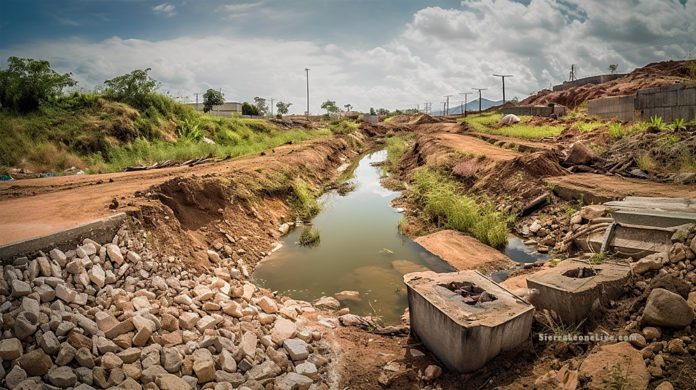
SLPP’s Progress on Water and Sanitation Infrastructure Development in Sierra Leone
By the Sierra Leone Live Team.
Sierra Leone Live is dedicated to investigating the SLPP’s performance in fulfilling its manifesto promises as the June 24, 2023 elections approach. This article focuses on Part V of the 2018 SLPP Manifesto, “Developing Infrastructure: Increasing Access to Water Supply and Improved Sanitation.” We will examine the SLPP’s goals and objectives in this area and report on whether they have delivered on their promises.
According to UNICEF and WHO, having access to clean drinking water and improved sanitation is a fundamental human right. These organizations have determined that improving water and sanitation access promotes good health, reduces mortality rates, and lowers teenage pregnancy and school dropout rates. Despite being endowed with substantial rainfall and numerous rivers, Sierra Leone’s population faces challenges accessing clean water and sanitation facilities.
According to the manifesto, only 43% of the population has access to safe drinking water (86% in urban areas and 26% in rural areas), while only 13% have access to improved sanitation (24% in urban areas and 6% in rural areas). Pipe-borne water supply is largely limited to Freetown, with rural areas relying on contaminated surface water.
The SLPP’s manifesto highlights several challenges to water supply and sanitation infrastructure, including inadequate water in dams, poor distribution networks, institutional arrangements, deforestation, maintenance issues, and poor coordination between various MDAs. To address these issues, the manifesto outlines specific policy actions for urban and rural water supply and sanitation.
For urban water supply, the SLPP aims to construct a new water reservoir for Freetown, rehabilitate the water distribution network, introduce flow meters, speed up institutional and regulatory reforms, and strengthen the maintenance culture and capacity of the Guma Valley Water Company. For rural water supply, the SLPP plans to construct boreholes, gravity water systems, and solar water pumping schemes; develop local councils’ capacity, and improve coordination between international agencies and NGOs.
In terms of urban sanitation, the SLPP proposes carrying out a study to develop a central sewage system, enforcing the change from pit latrines to pour flush or full flush in cities, reintroducing special cleaning days, expanding public-private partnerships in garbage collection, introducing recycling and incinerator facilities, and implementing a rainwater drainage system. For rural sanitation, the manifesto suggests establishing a rural sanitary inspectorate, implementing a National Community-Led Total Sanitation (CLTS) program, and developing communities’ capacities to construct latrines in rural areas.
Sierra Leone Live will investigate the extent to which the SLPP has achieved these goals and objectives in water and sanitation infrastructure development. We will conduct an unbiased SLPP’s Progress on Water and Sanitation Infrastructure Development and assessment of its performance, examining the progress made, challenges faced, and future prospects for improving access to clean water and sanitation for the people of Sierra Leone. As the June 24, 2023, elections draw closer, we will report on whether the SLPP has delivered on its manifesto promises and provided the necessary infrastructure improvements to ensure a better quality of life for Sierra Leoneans. Follow this link to visit the Ministry of Water Resources website.



